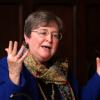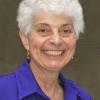The blessing women find in their relationship with Jesus is not simply private and spiritual, though it is certainly that. But it also affects their life in public and social domains, inspiring the struggle for liberation from structures of domination in every dimension of life.
"Once poverty is gone, we’ll need to build museums to display its horrors to future generations. They’ll wonder why poverty continued so long in human society — how a few people could live in luxury while billions dwelt in misery, deprivation, and despair."
“We commit to look with eyes of compassion, to relate with openness and hospitality, and to act from a center of contemplative prayer, peace and passion.” There are many reasons why I made the leap from my career as a mid-level government bureaucrat to become a Sister of St. Joseph of Peace.
Susan Rose Francois is the assistant congregation leader for the Sisters of St. Joseph of Peace. She is co-editor of the forthcoming book Reseeding Religious Life through Global Sisterhood. Read more of her work on her blog, At the Corner of Susan and St. Joseph.
I’m not a social worker, but what really got me was listening and meeting young women face to face and hearing that story. The brutality and injustice of human trafficking changed me; the women were the ones who changed me – it wasn’t the statistics and the analysis of the issue, it was the young women who have suffered incredible stress.
Mercy Sr. Mary McGrory, 69, is a nurse and clinical psychologist in New York City.
What's next for Sr. Simone Campbell? No stranger to the spotlight and a champion for fair treatment of the disadvantaged in the United States, she talks to Global Sisters Report about NETWORK.
Michael O’Loughlin is a writer based in Washington, DC. He’s written for National Catholic Reporter, America, Foreign Policy and the Advocate, and he has appeared on Fox News and MSNBC.
GSR TODAY - We’re a week into Global Sisters Report and we’re feeling pretty darn good. We’ve had visitors from more than 100 countries, which means that thousands of people around the world are discovering GlobalSistersReport.org. But how are you feeling about it? What do you like? What not so much?
"Unable are the Loved to die, for Love is Immortality; Nay, it is Deity. . ."





